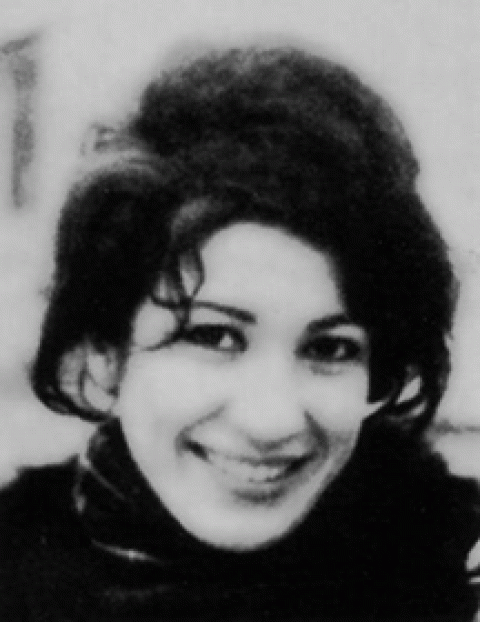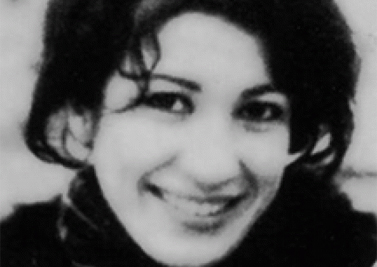“P
oetry is my God,” Forugh Farrokhzad once wrote in a letter to her father. “I am happy when my soul is content and poetry satisfies my soul, whereas if I have all these good things that people kill themselves for and am deprived of writing poetry, I will kill myself.” Farrokhzad encapsulates this life-or-death relationship to her art in “Another Birth,” the titular poem of a collection that by turns modernized and scandalized literary Tehran when it was published 50 years ago in the spring of 1964. Its first line—“My whole being is a dark chant”—affirms the Persian littératrice’s artistic credo: poetry as life, life as poetry.

This was a revolutionary stance for a woman living in mid-century Iran. After all, men dominate the entire Middle Eastern literary tradition, so much of which is organized around the tension between the active male lover and the passive female beloved. The paradigmatic example of this is of course the centuries-old story of Leyli and Majnun, a sort of proto-Romeo and Juliet that figures prominently in the history of Middle Eastern and South Asian art and literature. (Briefly: The two are forbidden to marry, leading Majnun, which literally means mad, to go crazy, move to the woods, and write poetry; in the end, Leyli dies, as does Majnun.) Originating in the verse of the 12th-century Persian poet Nizami, this legend of star-crossed lovers still permeates Middle Eastern literature. But many later interpretations of the story dwell on the point-of-view of the moon-struck Majnuns and never the Leylis with whom they are helplessly besotted.
Here’s where Farrokzhad offers a corrective: Another Birth, as well as her three earlier collections, The Captive, The Wall, and The Rebellion, inverts this patriarchal dynamic, privileging Farrokhzad’s own feminine voice above all others.
Many scholars take Farrokhzad to be the speaker of “Another Birth,” which begins by observing how poetry has the power to preserve the people who make a life so meaningful—and painful: “in this chant / I grafted you to the tree, / to the water, to the fire,” she writes, probably alluding to one Ebrahim Golestan, doubtless the “E.G.” to whom the volume is dedicated. That’s at least the interpretation of Michael Hillman, the professor of Persian whose excellent book, A Lonely Woman, is one of the few English-language treatments of Farrokhzad’s life and poetry.
Golestan, a prominent Iranian filmmaker and intellectual, was married with kids, but that didn’t stop the two from beginning a sensational affair that was the talk of the Tehran literary set in the 1960s. Farrokhzad did little to quell the gossip: in fact, she offers her side of the story in “Another Birth.” According to Hillman, Golestan would leave Farrokhzad to go home to his family every night and return in the morning, an experience Farrokhzad seems to describe in “Another Birth”:
This affair with Golestan suffuses Farrokhzad’s poetry with a melancholy reminiscent of Plath. Farrokhzad did have more than enough reason to feel low. At 18, after she divorced her husband—the satirist Parviz Shapour, who she had begged to marry two years earlier—she was forbidden by law and by her husband’s family from seeing her young son ever again. This event would haunt her later verse and likely figured in her decision to adopt a child from the leper colony that she filmed in her acclaimed documentary, The House Is Black, which Golestan produced.
The specter of Golestan aside, “Another Birth” is very much a paean to the quotidian. That’s where real life takes place, the individual moments of the day to day—which are occasionally punctuated by things not so ordinary:
This focus on the single moments of the present shortly gives way to a preoccupation with linear time and literary legacy. Farrokhzad wonders aloud: Is her poetry good enough to make a dent in “the line of time?” Will she endure?
Today Farrokhzad’s popularity is such that the prospect of her fretting about her future reception seems absurd. She was widely read during her lifetime, and scholars now consider her one of the most important Persian poets of the 20th century. She continues to influence Iranians and the diaspora in this century as well, including the likes of Shirin Neshat, who adapted a Farrokhzad poem for a visual piece in the New York Times in 2011. “The epitome of what the Islamic Republic wanted to eradicate, Farrokhzad is now the Iranian equivalent of a rock star,” writes Farzaneh Milani in the Washington Post. “An industry has developed around her name.”
Tragically, Farrokhzad would not live to see this legacy. In 1967, just three years after the publication of Another Birth, she died in a car accident, aged 32. The actual details of the accident are apocryphal: some say that she swerved to avoid hitting a school bus full of children, while others (even more dubiously) claim it was a suicide. In any case, many have noticed that her poem “Let Us Believe in the Beginning of the Cold Season” seems to eerily presage the season and manner of her death:
Ah,
who’s looking out for accidents at the intersection
when the whistles are shrilling Stop!
…
I said to my mother, “It’s all over now”
I said, “The accident always occurs before there’s time to think—
we have to send condolences to the obit page”
Even in these lines, it seems Farrokhzad was mulling her poetic afterlife. In an interview she gave three years before her death, she waxed philosophic on this subject:
Farrokhzad’s comments recall both Sappho (“You may forget but / Let me tell you / this: someone in / some future time / will think of us”) and T.S. Eliot, whose essay “Tradition and the Individual Talent” emphasizes the simultaneous order in which all literature—present, past, and future—traffics. Farrokhzad did not pretend to know her place in the literary pantheon, but the poem’s last lines, flecked with Sufi imagery, suggest someone who might: Hafez. “No fisherman shall ever find a pearl / in a small brook that empties into a pool,” writes Farrokhzad, alluding to a poem by 14th-century Sufi poet. The pearls are in the ocean. You might find them, you might not. But if you want to write great poetry, you have to take the plunge.
Read “Another Birth” here.

